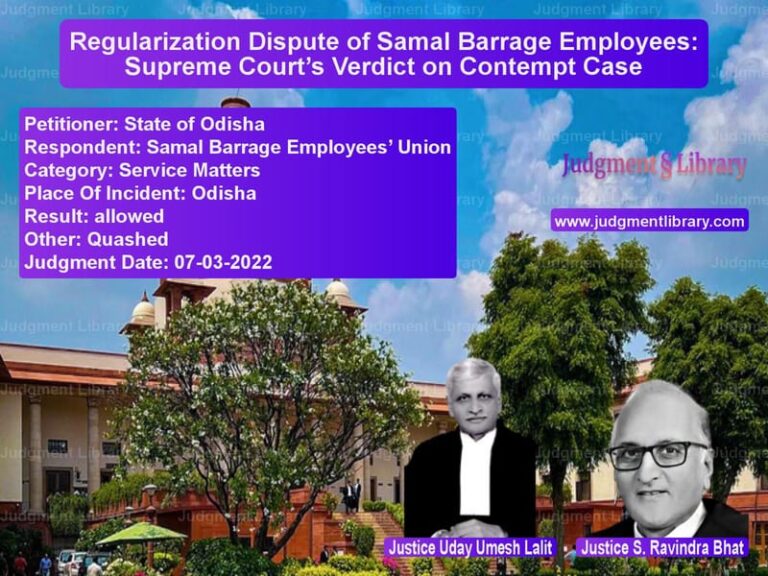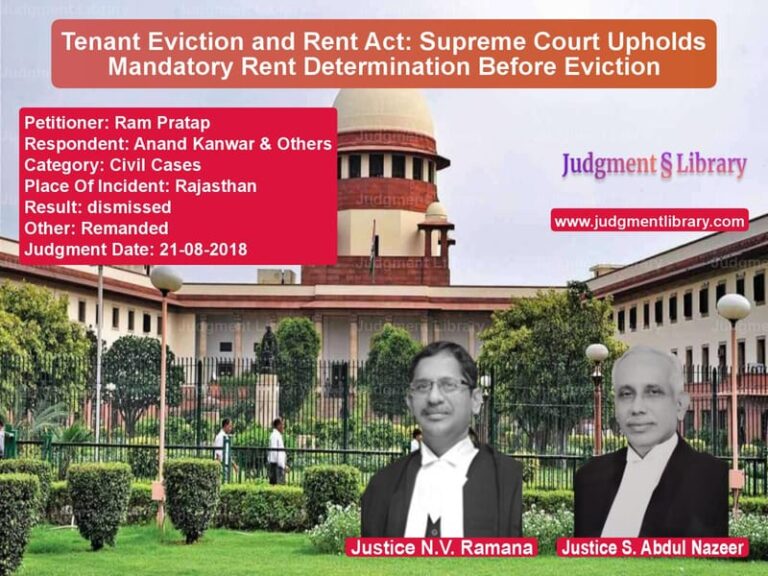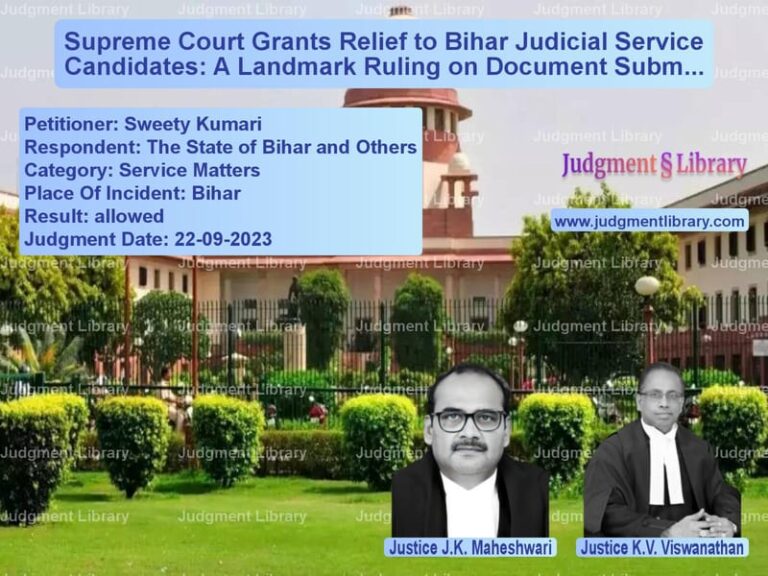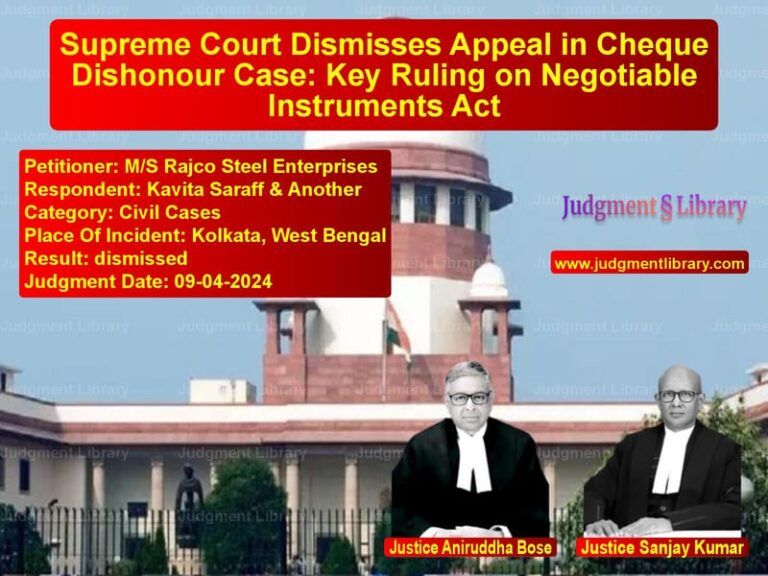Supreme Court Rules on Gratuity Forfeiture in Misconduct Cases: Key Judgment Explained
The Supreme Court of India has delivered a significant ruling in the case of Western Coal Fields Ltd. v. Manohar Govinda Fulzele, addressing whether gratuity can be forfeited in cases of employee misconduct, even without a criminal conviction. The decision clarifies the legal interpretation of the Payment of Gratuity Act, 1972, and sets a precedent for similar cases.
Background of the Case
The case involved appeals filed by public sector undertakings (PSUs) including Western Coal Fields Ltd. and Maharashtra State Road Transport Corporation (MSRTC) regarding the forfeiture of gratuity of employees who were dismissed for misconduct.
The primary legal question was whether gratuity could be forfeited if an employee’s termination was due to misconduct that constituted an offence involving moral turpitude, even in the absence of a conviction by a criminal court.
Key Legal Issues Considered
- Whether an employer can forfeit gratuity based on misconduct without a criminal conviction.
- Interpretation of Section 4(6) of the Payment of Gratuity Act, 1972, which allows forfeiture under specific conditions.
- Whether disciplinary proceedings proving misconduct are sufficient to justify forfeiture.
Arguments Presented
Petitioners’ Arguments (Western Coal Fields Ltd. and MSRTC)
The PSUs contended:
- That misconduct amounting to moral turpitude should be sufficient grounds for forfeiture, even without a criminal conviction.
- That proving misconduct in departmental proceedings should meet the legal standard for forfeiture.
- That allowing employees guilty of serious misconduct to retain gratuity would be against public interest.
Respondent’s Arguments (Employees)
The employees argued:
- That gratuity is a statutory right and cannot be taken away without strict adherence to the law.
- That Section 4(6) of the Payment of Gratuity Act requires an actual criminal conviction for an offence involving moral turpitude.
- That the Supreme Court’s earlier judgment in C.G. Ajay Babu v. Union Bank of India established that gratuity cannot be forfeited without a criminal conviction.
Supreme Court’s Observations and Judgment
The Supreme Court ruled in favor of the PSUs, holding that gratuity could be forfeited if an employee was dismissed for misconduct constituting an offence involving moral turpitude, even without a criminal conviction.
Key observations by the Court:
- “The requirement of the statute is not proof of misconduct but that the act should constitute an offence involving moral turpitude.”
- “There is no requirement in the Payment of Gratuity Act that such an offence must be ‘duly established in a court of law.’”
- “The forfeiture of gratuity is at the discretion of the employer if the misconduct constitutes an offence involving moral turpitude.”
- “The standard of proof in disciplinary proceedings (preponderance of probabilities) is different from that in criminal trials (beyond reasonable doubt).”
- “A criminal conviction is not a precondition for forfeiture under Section 4(6) of the Payment of Gratuity Act.”
Final Judgment
The Supreme Court upheld the PSUs’ right to forfeit gratuity, with specific conditions:
- In cases where employees obtained employment by submitting fraudulent documents, complete forfeiture of gratuity is justified.
- For employees of MSRTC who engaged in misappropriation of fares, forfeiture should be limited to 25% of their gratuity, recognizing the minor nature of the misconduct.
- The forfeiture process must follow due procedure, including notice to the employee and consideration of the gravity of the offence.
Impact of the Judgment
This ruling has far-reaching implications:
- Clarifies employer rights: Employers can now forfeit gratuity for misconduct without requiring a criminal conviction.
- Balances employee rights: The ruling ensures that forfeiture is proportionate to the severity of the misconduct.
- Strengthens deterrence: Employees engaging in fraud or misappropriation risk losing their gratuity.
- Guidance for future cases: The judgment establishes a framework for determining when forfeiture is appropriate.
This Supreme Court ruling provides crucial clarity on gratuity laws and ensures that employees who commit serious misconduct cannot unjustly benefit from statutory gratuity protections.
Petitioner Name: Western Coal Fields Ltd..Respondent Name: Manohar Govinda Fulzele.Judgment By: Justice Sudhanshu Dhulia, Justice K. Vinod Chandran.Place Of Incident: India.Judgment Date: 17-02-2025.
Don’t miss out on the full details! Download the complete judgment in PDF format below and gain valuable insights instantly!
Download Judgment: western-coal-fields-vs-manohar-govinda-fulz-supreme-court-of-india-judgment-dated-17-02-2025.pdf
Directly Download Judgment: Directly download this Judgment
See all petitions in Pension and Gratuity
See all petitions in Disciplinary Proceedings
See all petitions in Public Sector Employees
See all petitions in Judgment by Sudhanshu Dhulia
See all petitions in Judgment by K. Vinod Chandran
See all petitions in partially allowed
See all petitions in Modified
See all petitions in supreme court of India judgments February 2025
See all petitions in 2025 judgments
See all posts in Service Matters Category
See all allowed petitions in Service Matters Category
See all Dismissed petitions in Service Matters Category
See all partially allowed petitions in Service Matters Category







